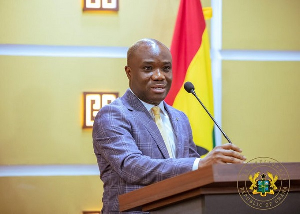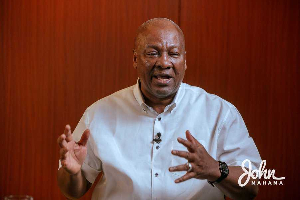Accra, May 27, GNA- Mr Owusu Ansah Quarshie, a Witness, on Thursday said the legal process of the Robert Norbert Quarshie murder trial involving W/O Salifu Amankwa, should have finished before the Executive granted the accused pardon.
Responding to questions from Professor Henrietta- Mensa Bonsu, a Member of the National Reconciliation Commission (NRC) at a public hearing in Accra, the Witness said the feelings of the family of Mr Quarshie who died in 1987 should also have been considered before the pardon was granted.
Witness said when Counsel for W/O Amankwa appealed against the death sentence, at best the case should have been recalled and finished to determine whether the appeal would be successful or otherwise before the then Government granted the pardon.
Mr Quarshie said he was in no way challenging the Executive's authority to grant pardon in murder case, but stated however: "I thought justice had not been done... I just came to terms with it."
Witness, who said he was a brother of the deceased, then 61, added that the late Quarshie was the Head of Family, a retired Accountant of COCOBOD, with five children, and was not a thief as those who sent him to the 37 Military Hospital morgue made the attendants believed.
He said he was told at the La Police Station that late Mr Quarshie was in the grip of the W/O, and he was told later at the 37 Military Hospital that the one who brought him there had said that he was a thief and died as he was being sent to the Gondar Barracks.
Witness prayed the Commission to help redeem his brother's image. He also said that the 1.5 million cedis compensation government paid to the family in 1995 was not enough, for a parent of five children and prayed the Commission to recommend an additional amount.
Mr Quarshie said police investigation led to the arrest of W/O Amankwa, who was charged with the murder of his brother, tried before a Public Tribunal and sentenced to death by firing squad.
He said the case was not recalled after Counsel for W/O Amankwa appealed, adding that within a month after the sentencing, he was granted an Executive pardon.
He said his petition to the then Head of State for compensation for the family was to no avail, and he later went to Mr Mike Gizo, then Greater Accra Regional Minister.
It was not until 1995 when the Greater Accra Regional Office paid a compensation of 1.5 million cedis to the family.
Witness said the wife of his late brother who had a shock had since been bedridden.
Another Witness, Mr Benjamin Narku Nortey-Botchwey complained of the taking over of a portion a plot of land at Kpehe, which belongs to his late father as a result of the construction of the Circle -Nsawam Road in 1974.
He said his father's request for replacement of the plot rather than monetary compensation was not granted.
The compound house on the plot was pulled down.
The Accra Metropolitan Authority (AMA) was using the remaining part of the plot as a refuse dump. The Authority had also refused to eject people who had mounted kiosks on the land.
Witness prayed the Commission to help eject the squatters on the land, but Counsel for the Commission Abena Manful said it would be necessary for him as the owner to assert his rights.
Commission Chairman Justice Kweku Amua-Sekyi asked Witness to support the indenture on the land, which he tendered, with a land document. Madam Patience Kai Okai, another Witness, from Teshie in Accra, said a court sentenced her to four months imprisonment in 1977 for allegedly selling cloth above Government controlled price.
She said a woman to whom she sold the cloth, and a man arrested her at Tema New Town where she went round selling the cloth. They seized 10 full pieces of GTP prints.
She said six other full pieces of other prints, which she was asked to come for were not given to her, and she was later told that it had been sold and paid into government chest.
She said as result of the prison term she contracted a disease, which often made her body swell and prayed to Commission to recommend and appropriate compensation for her.
The Commission reasoned with Mr Samuel Nii Armah-Tsei Tagoe, former Personnel Administrator of Ghana Ports and Harbour Authority to discard thoughts that his superior officers hated him for being affected by a redundancy exercise in 1989.
Witness had told the Commission that he never expected to be affected by a redundancy exercise for which he was part of the team that set out the criteria.
He said three of the people in his department were to be laid off, but the axe affected him too.
He added that he was victimised by his immediate boss, Mr John Aidoo, but the Commission reasoned with him to realise that he contributed to his exit by belonging to a committee that set 55 years as one of the criteria for the lay off.
Witness was then above 54, and the Company was then laying off 50 per cent of its staff to ensure efficiency.
Mr Christian Appiagyei, a Member of the Commission, who is also a former Secretary General of the Ghana Trades Union, told Witness that it was illegal to have set the retirement age at 55.
"You were breaking the law, you have no right to change the compulsory retiring age to 55", he said, adding that most employees in other places were affected by such practices, with politicians even joining in.
General News of Thursday, 27 May 2004
Source: GNA
















